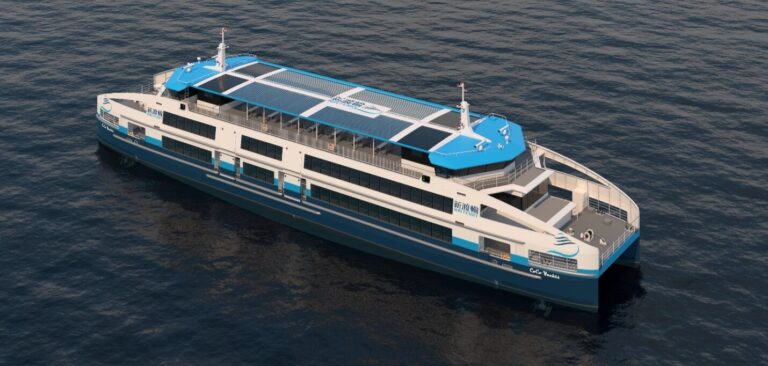Two hybrid double-hull, double-ended ferries with onboard battery and solar power technology are to be classed by classification society Bureau Veritas before entering service in Hong Kong, China.
Built by YaGuang Technology in Zhuhai, China, each vessel has an aluminum hull and superstructure. The first vessel will feature a hybrid diesel-electric propulsion setup to enable zero-emission operation within pier boundaries and when berthing. The second vessel will use a diesel-electric propulsion system. To reduce the amount of time that diesel generators need to be in operation, each ferry will be fitted with a battery pack for overnight energy. The third deck of each vessel will be partially covered by solar panels to reduce overall emissions.
The ferries will each be fitted with four International Maritime Organization Tier III diesel generators enabling a top service speed of 16kts. Four azimuth L-type thrusters will also be fitted to each vessel, in addition to a PM electric motor.
The Urban Sprinter 1000 vessels – designed by CoCo Yachts – will be operated by Sun Ferry Services on a route between Central Pier and Cheung Chau Pier in Hong Kong domestic waters. The vessels will carry approximately four million passengers each year.
Bureau Veritas will be responsible for surveying and certifying the design and build of the ferries. Furthermore, all flag-related items, including safety and stability, will be delegated from the Hong Kong Marine Department to the classification society.
The first vessel is scheduled for delivery in Q2 2024, and the second in Q1 2025.
“BV is very proud to play a significant role in this partnership with CoCo Yachts, YaGuang Technology and Sun Ferry, to deliver these innovative ferries for Hong Kong domestic waters,” said Alex Gregg-Smith, senior vice president and chief executive, North Asia and China at Bureau Veritas Marine & Offshore. “BV is honored to support the project from its inception, providing full plan approval and design support, and we are happy to help advance innovation that is much needed to achieve a carbon-neutral and sustainable future for the benefit of all marine stakeholders, the environment and society as a whole.”



